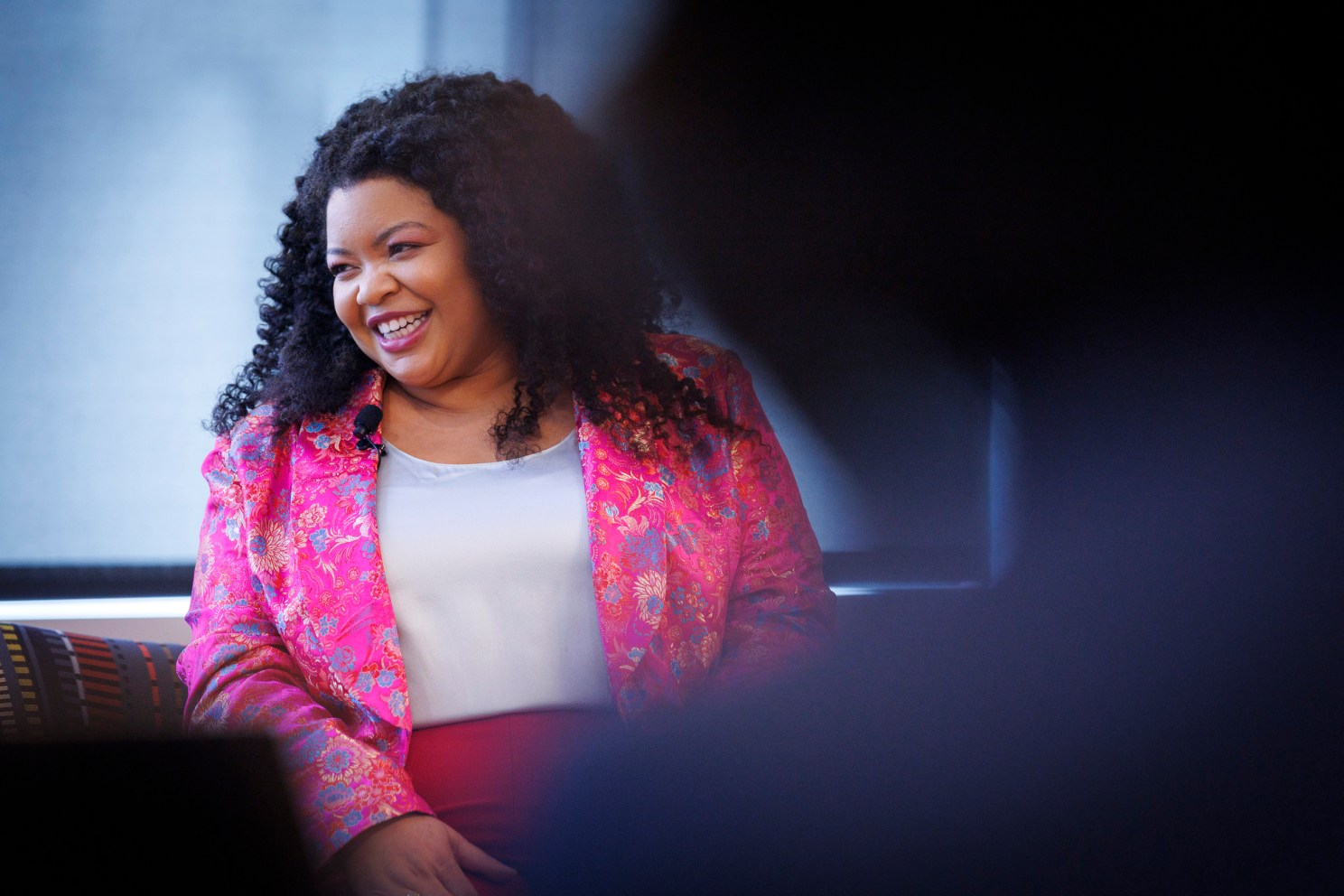How dating sites automate racism
Sociologist’s new book finds algorithms that suggest partners often reflect stereotypes, biases

Apryl Williams
Stephanie Mitchell/Harvard Staff Photographer
Apryl Williams opened a Tinder account in 2013 and began wondering about the algorithms used by dating apps, how they selected potential matches, and what role race may play in the system.
Now, after nearly 10 years of research, the Black sociologist who studies race, gender, and popular culture has written a book about her findings, “Not My Type: Automating Sexual Racism in Online Dating,” a blend of technical analysis, user interviews, and a historical look at racism and romance in America.
Williams, a faculty associate at the Berkman Klein Center, sat down Tuesday afternoon to discuss the prevalence of sexual racism in online dating with Kendra Albert of Harvard Law’s Cyberlaw Clinic. Williams said her academic curiosity was sparked by a presentation at a 2015 annual conference for sociologists by Christian Rudder, co-founder of OkCupid, on his site’s sorting and matching algorithms.
“Someone in the audience asked why they were getting so many unattractive people in their match deck,” said Williams, who is also an assistant professor in the Department of Communication & Media and the Digital Studies Institute at the University of Michigan. “Rudder joked, ‘If you think your matches are ugly, that’s probably because you’re ugly.’”
“What dating apps do is automate sexual racism, making it hyper efficient and routine to swipe in racially curated sexual marketplaces.”
Apryl Williams
Dating sites, Williams said, use algorithms that attempt to predict attraction and attractiveness, and the sorting and ranking is often racially informed. By matching users with others who look like them, dating platforms both reflect and reinforce racial stereotypes and biases common in American culture, which attribute attractiveness and desirability to certain groups and rank others as less attractive.
“Dating apps allow sexual racism to flourish because they rely on the white hetero normative standards of attraction, desirability, and gender aesthetics to perform the sorting and matching algorithms that we are so comfortable with these days,” said Williams. “But sexual racism existed long before dating platforms came to be. What dating apps do is automate sexual racism, making it hyper efficient and routine to swipe in racially curated sexual marketplaces.”
Examples abound. Dating-app users often select matches based on racial preference, which tends to perpetuate racial biases. According to a 2014 study by OkCupid, users rated Asian men and Black women as less attractive than their counterparts.
“This is anti-Blackness and anti-Asian sentiment,” said Williams, “and these come from deeply rooted historical and contemporary ideas about how we view Asian masculinity and Black femininity.”
Black women are the least desired dating demographic, said Williams, and their experiences in the online dating world are often fraught: They tend to become targets of racism or objects of fetishization. If they’re desirable it’s because of their “otherness” and or “exoticism,” she said.
“Some people want a curated experience,” said Williams. “If they want to be able to say, ‘I only want to look for women who are Latina,’ or ‘I only want white femmes,’ the apps work for those folks. But those on the receiving end are often not having a good time. On the contrary, across the internet, women of color report being targets of racial fetishization.”
Williams urged dating platforms to do more to improve the experience for minority users and protect them when they encounter racism, homophobia, transphobia, and ableism. They should expand their safety protocols for monitoring and reporting such biases, she said.
They should also be more accountable to users by implementing legitimate feedback mechanisms and making data easily accessible. Williams noted the difficulty of acquiring her own information.
“I would encourage everyone to do it,” she said. “Because when you see the data they have on you, it might make you think twice about the trade-offs. I was able to see my geolocation data, all the interest groups that I had linked from my Facebook account, every picture I had uploaded, and every single conversation with a match that I had had.”
Still, dating sites are here to stay, said Williams, because they have become the modern version of traditional matchmaking. “People don’t meet romantic partners in the grocery store anymore,” she said. So her goal is not to discourage use but encourage transparency and awareness.
“Should the user break up with dating apps?” asked Williams. “I would say that the answer is no, but we should think about what they reflect to us. We should think about where our personal preferences come from, and ask if they’re neutral, or if they’re shaped by our larger culture.
“These systems do often fail us, and it’s important to talk about those failures, but it’s also important to celebrate work and community that many find in dating culture,” she said. “And sometimes you find love on the apps, and that’s why they’re worth fixing. I know people love to hate the apps, but they work.”
Williams said she was speaking from both personal and scholarly perspectives, having met her romantic partner on Tinder in 2021. They are now happily married.




